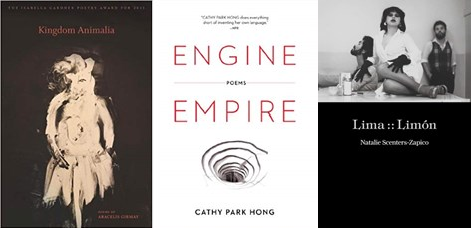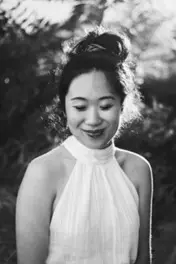The Meter Reader: Three Reviews
by Carlina Duan

In January, I experienced loss and a consequent re-shifting of my world. Poetry, of course, provided a new sort of logic for my heart to wrap around its blue noise. In poems, I deposited small pearls of feeling, found new ways to complicate my thought, room to root, then grow. Here are some of my stays from the past few months, books which have rooted me through a soft and fruitful phase of longing, fissure, community, and radical solace in solitude.
Aracelis Girmay’s Kingdom Animalia (BOA Editions, 2013) conjures grace, mortality, surprise. Girmay is a pillar poet for me — one of the poets I carry into the room each time I venture onto a page. In the title poem, Girmay’s speaker commands herself: “Oh body, be held now by whom you love. / Whole years will be spent, underneath these impossible stars, / when dirt’s the only animal who will sleep with you / & touch you with / its mouth,” an impossibly beautiful reminder of earthly presence, an anthem to the rhythms of the body when alive.
Cathy Park Hong’s Engine Empire (W.W. Norton, 2013) is a delicious delight. Hong, once again, demonstrates her incredible genius in linguistic innovation and formal play. Poems in Engine Empire fixate on the binaries (and spaces between) development and labor, wonder and terror, utopia and dystopia. Above all, Hong questions the mythology of a geographic wealth: in the ‘Wild West,’ in China, in a futuristic digital world.
I love reading Acknowledgments sections of books first, in order to invite into my reading all the other brains and hearts that made a book possible. And in Natalie Scenters-Zapico’s Lima :: Limón (Copper Canyon Press, 2019), she honors “all of the women of the world who suffer in silence,” making room for energies & centuries of labor that have otherwise been erased. Scenters-Zapico’s poems haunt me. “I want to corrode my husband’s / wedding ring. I want to be a lemon / with my equator marked in black ink — / small dashes to show my shape: pitted & convex,” she writes. Scenters-Zapico tugs apart desire, calls into question cultural traditions that bring about domestic violence, and consequently crafts power.
Carlina Duan is a writer from Michigan. She is the author of the poetry collection I WORE MY BLACKEST HAIR (Little A, 2017), and the chapbook Here I Go, Torching (National Federation Poetry Societies, 2015). Carlina is the winner of multiple Hopwood awards, a Fulbright grant, the Edna Meudt Poetry Award, and the 1st Place Winner of Narrative Magazine's 30 Below Contest. She has received scholarships from Juniper Writers' Institute and the Sundress Academy For the Arts (SAFTA). Her poems can be found in Black Warrior Review, Tinderbox Poetry Journal, Tupelo Quarterly, The Margins, and elsewhere. She is currently the Co-Editor-in-Chief of Nashville Review, and an MFA Candidate in Poetry at Vanderbilt University, where she teaches Poetry. She has a sweet tooth.
